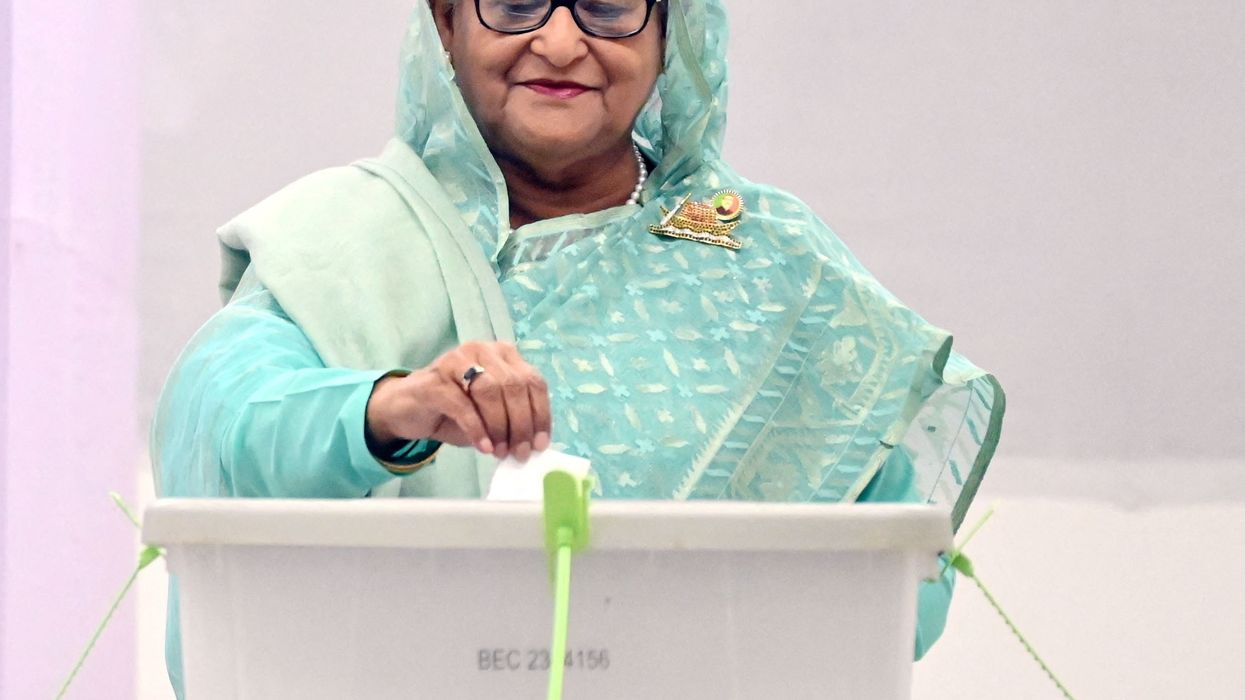Though several nations from Asia, Africa, and South America, alongside India, Russia, and China, congratulated Bangladesh’s Sheikh Hasina on her historic fourth term as prime minister, the United Nations, the US, and the UK voiced their reservations, terming the polls as "not free or fair."
Hasina's Awami League (AL) won 223 seats in the 300-member Parliament on Sunday (7) in the polls boycotted by the Bangladesh Nationalist Party (BNP), the main opposition.
The Bangladesh government had invited a large number of foreign observers from India and other countries, as well as multilateral organisations, to observe the elections.
The US State Department, in a press statement Monday, said that Washington remains concerned by the arrests of thousands of political opposition members and by reports of irregularities on election day in Bangladesh.
“The United States shares the view with other observers that these elections were not free or fair and we regret that not all parties participated,” the State Department said.
“We encourage the Government of Bangladesh to credibly investigate reports of violence and to hold perpetrators accountable. We also urge all political parties to reject violence,” it said.
UN Human Rights Chief Volker Turk called on Bangladesh's newly elected government to take steps to renew the country's commitment to democracy and human rights, voicing distress that the environment for Sunday's poll was marred by violence and repression of opposition candidates and supporters.
“In the months leading up to the vote, thousands of opposition supporters have been detained arbitrarily or subjected to intimidation. Such tactics are not conducive to a truly genuine process,” Türk said and noted that democracy was “hard-won” in Bangladesh and “must not become cosmetic.”
Around 25,000 opposition supporters have been arrested, including key party leaders, since October, the UN official said and raised serious concerns about possible torture or harsh conditions of detention as at least 10 opposition supporters reportedly died – or were killed – in custody in the last two months.
An associate spokesperson for UN Secretary-General Antonio Guterres, Florencia Soto Niño, in response to a question on whether the UN believes the elections were free and fair, said, “We have seen the situation that's unfolding there. The Secretary-General continues to follow what's happening. He notes the opposition's decision to boycott the elections.”
She said the UN chief is “obviously concerned” about reports of incidents of violence prior to, and during the elections.
The UK said that standards of credible and fair competition were not consistently met during Bangladesh's 12th parliamentary elections.
“Not all political parties took part in the elections. The Bangladeshi people did not therefore have the fullest range of voting options,” UK's Foreign, Commonwealth & Development Office (FCDO) said in a statement on Monday.
It said democratic elections depend on credible, open, and fair competition and respect for human rights, the rule of law and due process are essential elements of the democratic process while “these standards were not consistently met during the election period.”
The FCDO statement also expressed concern at the “significant number of arrests of opposition party members before polling day.”
In contrast, there were greetings and applause that were showered on Hasina by India, China, Russia, and several other countries from across Asia, West Asia, Africa and South America on Monday and Tuesday.
Indian Prime Minister Narendra Modi called up his counterpart in person and congratulated her on her historic re-election on Monday and reiterated India's commitment to further strengthen the “enduring and people-centric partnership” with its neighbour.
Sri Lankan President Ranil Wickremesinghe called the electoral triumph of Awami League a “testament to the trust and confidence bestowed by the people of Bangladesh in Prime Minister Sheikh Hasina's capable leadership” and expressed confidence that “Hasina's wisdom and wealth of experience will continue to benefit the people of Bangladesh.”
A Chinese foreign ministry spokeswoman on Tuesday (9) said Beijing congratulated Bangladesh for the successful holding of the election as planned and felicitated Awami League for winning the election.
“As an amicable and close neighbour of Bangladesh, China firmly supports Bangladesh in implementing the political agendas in accordance with its law after the election,” she said.
According to the Bangladesh Prime Minister's Office, ambassadors of Japan, Thailand, Vietnam, Indonesia, South Korea, Brunei, Malaysia, Egypt, Saudi Arabia, the UAE, Kuwait, Iraq, Iran, Qatar and Palestine called on the premier and greeted her for the election victory on Tuesday.
A Bangladesh PMO spokesman said ambassadors of India, Russia, China, Bhutan, the Philippines, Singapore, and Sri Lanka called on the premier at her Ganobhaban residence on Monday and pledged continued support of their countries for Bangladesh.
(PTI)




